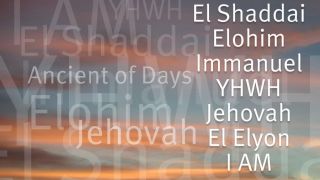It is the most important question of your life—is there a God, One who knows you, and One whom you can know? Who is God? What are His names? What is He like? Does God care about you? Does He have a purpose for your life, for your existence? And, most important, can you come to know Him—personally?
Searching for God
It is the rare person who hasn’t wondered about the existence of God. Our minds are such that we wonder. Is there something, or someone, who is beyond what we can see with our eyes and who is bigger than the physical universe we are a part of?
We can wonder, we can search, and we can question, but can we know the answer? If so, where is the answer to be found?
Yes, there is a God—a personal, eternal Creator of all that exists. And He has revealed to humanity the essential things we need to know about Him—His character, His purpose for our lives, what He expects of us, and what He has determined about our future.
It’s sad to say, but most of humanity has turned a blind eye to what God has revealed.
Is God real? What is the origin of God?
Is God a creation of the mind of man? A comforting and consoling thought that maybe there is someone who can help us in time of need? Or is God much more?
Did God create man in His own image—or is it the other way around? What do you know about this question?
Have you simply, perhaps even carelessly, accepted what other people have told you without really thinking about it? If so, consider the question of who or what God is carefully, because the implications for your life are huge.
Materialism and humanism conclude there is no God
In the world today, millions of people hold to the beliefs and conclusions of materialism and humanism. According to these ideas, physical matter—and the laws of physics and chemistry that act on matter—are everything.
As the famous astronomer Carl Sagan summed it up, “The cosmos is all that there is or ever was or ever will be.”
In this way of thinking, there is nothing beyond matter—no God, and certainly no God who can be known personally. Such teaching has become widespread, especially in the Western world, in the last two centuries.
If the conclusions of materialism and humanism are adopted, then the answer to the question “What or who is God?” becomes “God is nothing—except the imaginings of human beings.”
According to this way of thinking, as the human race has slowly evolved from lower life-forms, it has invented God as a superstitious answer to questions about life that it cannot otherwise answer.
That is, religion—and ideas about a God or gods who are beyond nature, beyond the cosmos—is a remnant of ignorance from mankind’s evolutionary past. In modern times, in its highly evolved state, mankind (at least those who consider themselves enlightened) has rightfully discarded these old, superstitious notions of God.
Accordingly, atheists believe that modern, enlightened man no longer needs God. Some proponents of materialism even say that religion is for life’s losers. Those who can’t make it on their own have resorted, in their weakness, to religion and notions of a God or gods, or of a better afterlife. They are to be pitied as slaves to superstition and outdated thinking.
Many influential people in the modern world’s institutions of education and culture advocate these conclusions. Millions of people have accepted them, at least to some degree.
If exposure to these teachings hasn’t completely destroyed people’s faith in a purposeful, personal and supernatural God, it has certainly weakened and watered down that faith.
How about you?
But is there more to understanding God?
Who is God? If left to ourselves, we humans simply speculate, guess and wonder about how to answer the question. Or we turn it over to other people to do our thinking for us—and we inevitably end up in a futile pursuit for understanding.
But the question of who and what is God is far too important to be left to whatever shifting philosophical fads currently exist or to the prejudiced ideas of skeptics or, for that matter, even to radical religious zealots.
There is a book that has existed longer than the philosophies of materialism and humanism. Those who wrote this book claimed that they were personally in contact with the one, true Creator God. They say, in fact, that this God actually inspired what they wrote, and they claimed to know Him personally.
Furthermore, they wrote that God has a plan—a purpose—for each human life. They claimed that what they wrote in this book called the Bible is truth—from the God of truth. They staked their lives on it!
Another way to understand God is to be willing to take a close look at what He reveals about Himself in the only book that can be seen as a legitimate source of information about Him.
Most people own a Bible, but most people—even Christians—have never really honestly or thoroughly examined the Bible to see what it reveals about God. You will likely be very surprised to see what God says about Himself!
In the pages of the Bible are the following revelations from and about this one and only true, eternal Creator God. In each case, we have included some of the scriptures that are the basis for these statements.
Please take some time to read these verses of the Bible and to think about them and their eye-opening conclusions. They are, in all respects, at dramatic odds with the teachings of materialism, humanism and, yes, many common ideas of religion as well.
Who is God? What is He doing?
The Bible answers the question, Who is God? Here are some of the most critical answers to understand:
- God is a family. At the God level, two beings exist in a family relationship—a Father and a Son, both of whom are eternal, spirit, uncreated. In the Bible, both members of the God family—God the Father and Jesus Christ the Son—are referred to as “God” (John 1:1-3, 14; John 4:24; John 20:17, 28; Ephesians 3:15; Hebrews 1:1-2).
- God is a Father who has a purpose—a plan—for every human being who has ever lived. That purpose is to become, eventually, in the working out of God’s plan, the spirit-born sons and daughters of God—children in that same family that now consists of the Father and the Son (Genesis 1:26; 2 Corinthians 6:18; Hebrews 2:10; 1 John 3:1-2).
- God’s fundamental nature is love. God loves His creation and wishes to have a personal relationship with all who are willing (1 John 4:7-8; Matthew 11:28; John 6:37; John 14:23; 2 Corinthians 6:16).
- God is holy, with perfect, righteous character; and His purpose is to create in human beings that same righteous and holy character (Revelation 21:3-4; Leviticus 11:44; Deuteronomy 32:4; Matthew 5:48; Psalm 18:30; Psalm 99:9; Philippians 1:11; 3:9).
- God has given humanity His law, which is a reflection of His righteous character; and violation of that law is what He defines as sin (Psalm 119:172; Romans 7:12-14).
- Entrance into the God family is made possible for human beings by their accepting God the Father’s gift of the sacrifice of His Son (Jesus Christ) for the forgiveness of their sins (John 3:16; Galatians 1:4; Hebrews 2:9).
- The cosmos—the created realm—is a testimony to the eternal creative power of God, which should lead people to believe in God’s existence. People who believe in materialism are, in the judgment of God, “without excuse” for rejecting the conclusion that God exists (Romans 1:19-23; Psalm 19:1-6; Psalm 14:1).
Again, these are only some of the things to understand about God, and only an overview at that.
What we can and can’t understand about God
It is true that we cannot fully understand all there is to know about God. God is not limited by time or space as we are.
There are some aspects of God that are beyond our comprehension. The apostle Paul said as much in his inspired letter to the Romans. “Oh, the depth of the riches both of the wisdom and knowledge of God! How unsearchable are His judgments and His ways past finding out!” (Romans 11:33).
However, God has chosen to reveal quite a lot about Himself in the Bible, and in the natural world (Romans 1:20). There is quite a lot about Him that we can know!
It should not erode our faith to admit there are some things we cannot understand about God. After all, how much do we not understand about humans? We could just as easily ask, “What is man, and what is the meaning of human existence?” The humanists, secularists, atheists and agnostics could not really answer that.
Just because some questions about God are not yet answered is no reason to reject what He says He is.
What Jesus revealed about God the Father and Himself
In the Word of God (the Bible) and through the “Word” of God (Jesus Christ), we find very logical answers to the questions “Who is God?” and “What is He doing?” The member of the eternal God family who is known to us now as Jesus Christ came to declare the truth about the Father and Himself, to set an example of how we are to live and to offer His life as a sacrifice for our sins.
Consider what the following passages reveal about God and the Bible He inspired:
- “Jesus said to him, ‘I am the way, the truth, and the life. No one comes to the Father except through Me’” (John 14:6).
- “Sanctify them by Your truth. Your word is truth” (John 17:17).
- “You have known the Holy Scriptures, which are able to make you wise for salvation through faith which is in Christ Jesus. All Scripture is given by inspiration of God, and is profitable for doctrine, for reproof, for correction, for instruction in righteousness” (2 Timothy 3:15-16).
- “No one has seen God at any time. The only begotten Son, who is in the bosom of the Father, He has declared Him” (John 1:18).
- “All things have been delivered to Me by My Father, and no one knows the Son except the Father. Nor does anyone know the Father except the Son, and the one to whom the Son wills to reveal Him” (Matthew 11:27).
Now that you know who God is, what should you do?
You can understand more about God if you are willing to take an unbiased look into His Bible with a heart to learn. The apostle Paul told the idolatrous Greeks that humans “should seek the Lord, in the hope that they might grope for Him and find Him, though He is not far from each one of us; for in Him we live and move and have our being” (Acts 17:27-28).
If you are truly seeking to have a fuller understanding of the answer to the questions “Who is God?” and “What is God?” we hope that the material in this article and related articles on this website will be of assistance to you.
Study the Bible prayerfully, with a mind open to God’s truth—even if it differs from what you have believed before. We invite you to ask God to increase your understanding of what He has revealed about the answer to these fundamentally important questions.
The articles in this section answer many related questions, such as:
- Where is God?
- What is God like?
- What are the names of God?
- How can we have a relationship with God?
- How is God one?
- What does the fear of the Lord mean?
- How do we please God?
- What is God’s will for me?
One resource that can help is “Knowing God,” our free seven-day Journey. Let us be your guide as you spend a week discovering who God is and what He has in store for you—in this life and the next.



































